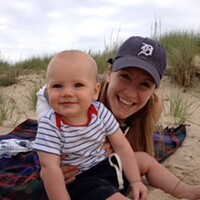Lessons in parenthood from a 40-year-old toaster
Loading...
I have a 40-year-old toaster. It is an old General Electric toaster oven, which toasts when you press the sliding handle down and pick a toast color, and which bakes when you push the handle up and pick a temperature. It has traveled around the country with me; from its home in suburban Detroit to Colorado State University in Fort Collins, Colo., then New York City, Seattle, Boston, and now Norfolk, Va.
I often tell people it is powerful enough that it could cook a squirrel. That’s a horrible thing to say really, and I would never actually consider even attempting it. But when I describe it that way, somehow that clearly defines the sturdy, American-made construction of the appliance. That same sturdiness applies to my parents’ marriage.
As the story goes, my parents received that toaster as a wedding gift in 1974. After getting married they had three babies every two or so years, and by the time they were the age I am now, 34, they had a kid in fifth grade, one in second, and a pre-schooler. They had already experienced college, new parenthood, new jobs, and road trips across the country with three kids in an era when even a Walkman cassette player was a total luxury, let alone DVD players installed in cars.
This year, they celebrated their 40th wedding anniversary, the same day I was making toast in their old toaster oven.
I think about how much new parents, like myself, take for granted today. My parents don’t tend to give me the “When I was your age” spiel because when they were my age, they were in a completely different place in life.
I graduated college and worked for a decade before deciding to stay home as a mom; my mom skipped college to have kids, and finally earned her bachelor’s degree in 2005. My husband and I, who started dating in our late 20s, didn’t have a child until I was 32, meanwhile my mom and dad started dating in high school and my mom had all of her babies by the time she was 24.
So, while my parents don’t give me the “When I was your age” spiel, they do marvel at parenting tools today that didn’t exist when they were raising their kids.
As a parent today, I complain when I run out of pre-portioned baby food squeeze packets, ready to eat as soon as you screw off the lid, sippy cups that actually keep liquids in, and pre-fastened disposable diapers. All of these simple inventions that parents like me mindlessly use were like walking on the moon for the previous generation of parents.
And when it comes to technology, it seems discarded iPhones and iPads, sometimes new ones, are made into personal entertainment devices for kids. I used to have to call my parents collect from a pay phone to come pick me up at the mall in high school (“Will you accept a collect call from ‘PICK ME UP AT THE MALL;” click).
We can’t fathom taking a five-hour plane trip without digital provisions for our young son, but my parents would pack us in a car for multiple days without anything but a book on cassette tape. We once listened to the whole Bible, read by the Royal Shakespeare Company, on a trip from Michigan to Colorado. I am happy to say that even after that experience, I am still a woman of faith.
Today, parents like me want everything immediately, and we want to find answers right away when it doesn’t all work out. We take to the Web; we ask friends on Facebook; we vent about our frustrations online; we Skype our parents for advice. Our parents grew up in relative isolation, having friends and relatives, but not a fraction of the resources we have today.
And I think in some ways that was a good thing. Because with all those resources, many of us today are just as stressed out about raising kids as they were, but perhaps more frustrated, because we feel we should be able to find the answers now.
That’s where waiting for toast comes in handy.
Amid the lightening speed of interactions and getting things done, sometimes we have to just stop and take a moment.
What was probably a premier kitchen appliance when my parents married now nurtures patience and an appreciation when I slow down and marvel at the simple, tried-and-true power of that old toaster.
It’s worth waiting for the slices of toast to take account of the magic in the ordinary, to appreciate the simplest elements of life, and to feel blessed by progress that has shown itself in my lifetime.
That’s when I learn the lesson all parents try to teach kids at an early age – appreciate what you’ve got. This lesson is brought to me by GE.
Now just shy of retirement age and happily married, my parents remain an exception to the dire prediction of divorce for those who marry young, and they are living up grandparenthood while they are still young themselves. They wouldn’t have wished a lot of their circumstances on anyone else, but they wouldn’t trade the life they have lived for anything.
I am happy that I have two parents to share their wisdom, and a toaster that still works.






